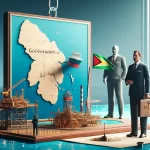Let’s make a few things clear: Payara Approval has been put on hold to allow for a review of field operations, how to conduct drilling, avoid a well-blowout, etc. It is really an engineering review. Nothing to do with review of the Contract.
The Guyanese people want a renegotiation of a few basic issues of the Contract. (One poll reported 80% of the people wanted a renegotiation). In the election campaign rally PPP speakers promised renegotiation, they made references to GW reporting that (1) Guyana lost out on $55 billion due to a lopsided contract favouring the Oil Company; (2) Minister Trotman may have been compromised when he rushed into signing the Contract against the advice of his consultants; (3) Contract had been signed in secret and kept secret for over a year; (4) Petroleum Advisor, Jan Mangal, said president Granger may not have known for several months that the Contract had been signed.
The recently installed PPP Govt. received a clear mandate at the polls to renegotiate the Contract. Nothing from President Ali and Mr Jagdeo (in the last few days) suggested the government intends to pursue renegotiation. This is very troubling.
CASE FOR RENEGOTIATION
(1) 2% royalty provided for in the Guyana Contract is unknown in the Oil business. Worldwide royalties in PSA-type contracts are 8% -15%.
(2) 75 of every 100 barrels go for Cost Recovery; 25 for profit-sharing. Guyana gets 12.5 barrels or 12.5%. Guyana’s total take is 14.5%. (Suriname is getting 36% on their Oil Contract). Guyana’s contract is front-loaded in favour of the Oil Company. For the foreseeable future years all Guyana will get is 14.5% (even less when shipping and marketing cost is deducted). Would the Oil Company agree to take 60 barrels for Cost recovery, 40 for profit-share? This point should be renegotiated. This way Guyana’s profit-share will rise from 12.5% to 20%.
GoG should ask for at least 8% royalty + 20% profit-share = 28%. This way Guyana will have a little bit more revenues for its economic and social development of the country.
Mike Persaud










